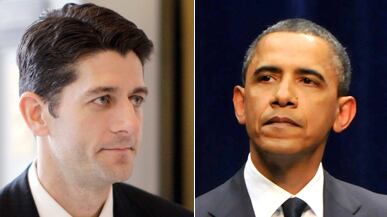Congratulations, Paul Ryan, you just got the worst job in politics: the chance to respond to the State of the Union, the president’s yearly address to Congress.
By its very design, the response spot is a diminishing one. There’s no sergeant at arms to announce your arrival. No geeky lawmakers reserving prime seats four hours before curtain, awaiting a brief moment to press the flesh. The State of the Union is American political theater at its grandest. The rebutter—in this case, the 40-year-old Wisconsin congressman—is usually exiled to a black-box setup, condemned to perform before an empty crowd. Last year, Republicans made a huge improvement in stage direction by planting newly elected Virginia Gov. Bob McDonnell in the Virginia House Chamber in front of a live audience.

Ryan must follow President Obama, who is flush after a clutch of eleventh-hour successes in Congress. He comes to the newly divided Congress with a fistful of victories: the repeal of Don’t Ask Don’t Tell, the passage of a new arms treaty with Russia, the extension of unemployment benefits, and increased health-care benefits for Sept. 11 emergency workers. Most viewers were comforted by the president’s turn as healer in chief at his Tucson speech. The dawning era of good feelings has bubbled up into Obama’s approval ratings. More than half the country—53 percent—told The Wall Street Journal/NBC News surveyors this week they approve of the job Obama’s doing. It’s the first time the president has been out of the red since August 2009.
Only two years ago, Louisiana Gov. Bobby Jindal was tapped by Republican elders to talk some sense into the electorate and tamp down Obama’s big-government dream. Jindal’s tale of the dangers of government intervention in the wake of Hurricane Katrina sounded tone-deaf even to those sympathetic to his message. And his halting delivery earned allusions to 30 Rock’s Kenneth the Page.
“It’s just a disaster for the Republican Party,” David Brooks insta-reacted.
“It was awful,” said another Jindal critic—actually, the governor himself. “Let me take responsibility—it’s so easy to blame others, blame consultants, blame advisers—I delivered the speech, it’s my fault,” Jindal said in November.
But Jindal shouldn’t just blame himself. The SOTU response is all about timing. Jindal was thrust into the spotlight one month after Obama’s historic inauguration. Up against the tidal wave of goodwill, not even Winston Churchill, let alone the thirtysomething governor, would have stood a chance. Democrats have been in the same position. Think kindly of the fool’s errand Rep. Dick Gephardt was sent on, shoved before the cameras to respond to George W. Bush’s State of the Union four months after Sept. 11, 2001.
It’s far better to nab a slot during the downhill slide of presidencies. Consider Jim Webb, who was tapped to respond to Bush in January 2007. With the Democratic presidential field still unformed and Bush waddling toward lame-duck status, there was talk of the so-called Webb phenomenon and murmuring about the ex-Marine-cum-novelist’s presidential chances. (Flash forward to today: Webb looks like he might retire, in part to avoid a second fight with former Senator George Allen.)
These days, the aim of the State of the Union response is to showcase a rising star in the minority party. The record shows how futile this is.
• Andrew Romano: The GOP’s Michele Bachmann ProblemThe “Webb phenomenon” underscores the new hype surrounding the SOTU response: These days, its aim is to showcase a rising star in the minority party. The record shows how futile this is. Through the 1980s, the response was given by a roundtable of senators and representatives, with the occasional governor. The first Bush and Clinton administrations were rebutted by a series of Senate big-foots and presidential wannabes: Howard Baker, Bob Dole, Paul Tsongas, and Joe Biden, among others. It’s the rare first responder who gets elected president (George H.W. Bush and Bill Clinton each shared the duty), let alone to any other higher office.
Ryan’s speech is about distilling the Republican tone and message—cutting government debt and deficits—now in vogue. Surely, Republicans’ favorite bully, Chris Christie, the bombastic New Jersey governor, was considered by House Speaker John Boehner and company. But Christie’s bravado may now be beyond the pale for our new conciliatory politics.
Plus, the baby-faced Wisconsin lawmaker is a certified brain in the party, standing cerebrum to cerebrum with his fellow Midwesterner Indiana Gov. Mitch Daniels. Ryan has been a hero in conservative circles for some time, part of the Republican three musketeers known as the “ Young Guns.” It was Obama himself who put the new House Budget Committee chairman on the national map when he name-checked Ryan during a famous exchange with Republicans at their Baltimore retreat last winter. Ryan’s budget plan, which he calls the “road map,” is much lauded by conservatives and calls for steep cuts to entitlements. So visionary is Ryan’s plan that many Republicans flinched from it during the midterms, fearing too much talk of cutting Social Security would make them electoral losers. It was the Democrats, Republicans said, who had evil designs for Medicare.
Not every conservative may cotton to Ryan’s CPA demeanor. And for some party activists, Ryan’s proximity to the party leadership may signal that he’s not willing to go far enough to challenge Obama and the Democrats. To help, the cool heads at Tea Party Express will be hosting Minnesota Rep. Michele Bachmann for a Web-casted response instead. And so a new tradition is born: the rebuttal rebuttal.
Samuel P. Jacobs is a staff reporter at The Daily Beast. He has also written for The Boston Globe, The New York Observer, and The New Republic Online.






